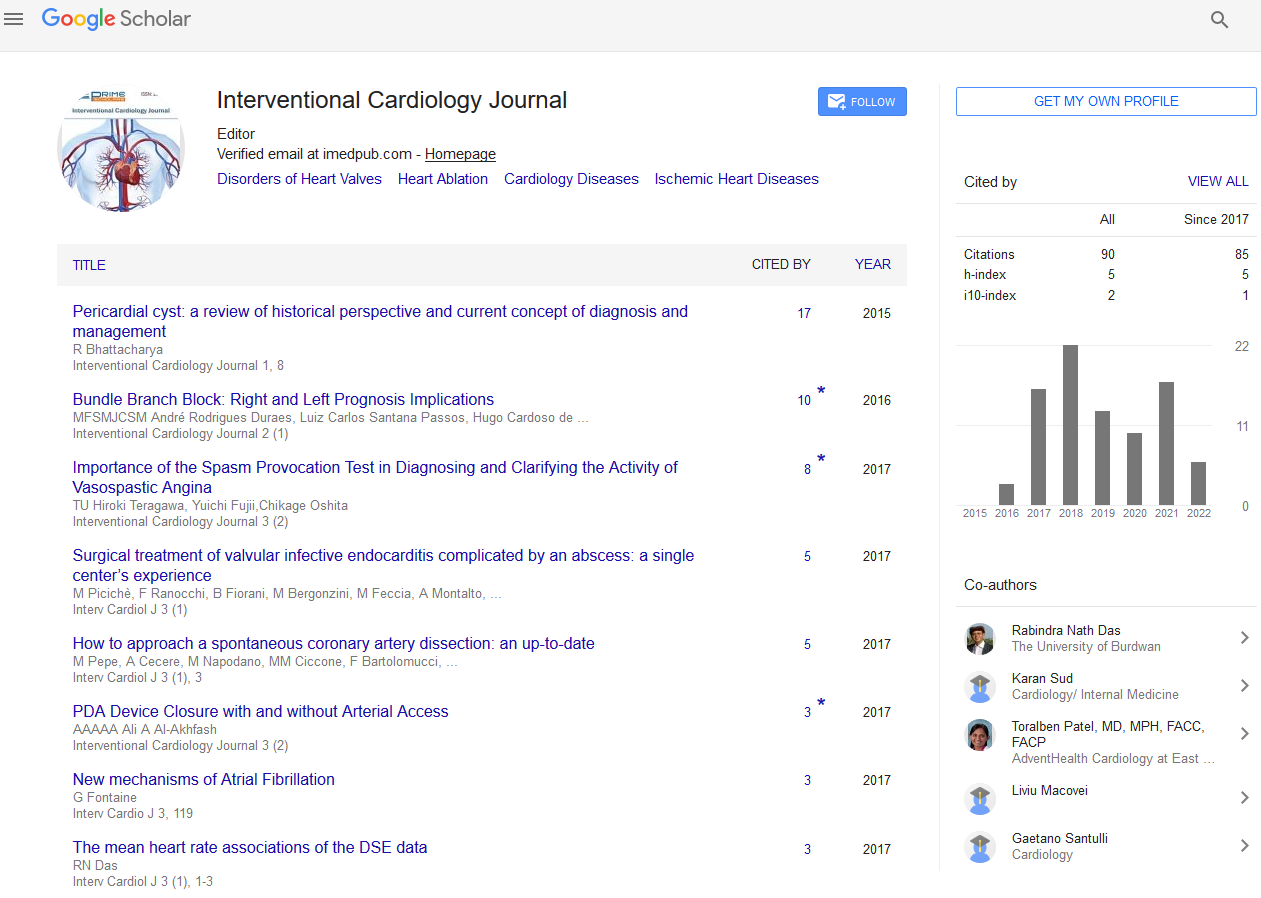Commentary - (2024) Volume 10, Issue 3
Navigating the Complexities of Geriatric Cardiology: Optimizing Cardiovascular Care for Aging Populations
Craig Rook*
Department of Medicine, New York University, USA
*Correspondence:
Craig Rook,
Department of Medicine, New York University,
USA,
Email:
Received: 28-Feb-2024, Manuscript No. IPIC-23-19343;
Editor assigned: 01-Mar-2024, Pre QC No. IPIC-23-19343 (PQ);
Reviewed: 15-Mar-2024, QC No. IPIC-23-19343;
Revised: 20-Mar-2024, Manuscript No. IPIC-23-19343 (R);
Published:
27-Mar-2024, DOI: 10.21767/2471-8157.10.03.24
Description
As life expectancy continues to rise globally, the demographic
landscape is undergoing a profound shift, with a growing
proportion of individuals reaching advanced ages. With
aging comes a higher prevalence of Cardiovascular Diseases
(CVD), presenting unique challenges for healthcare providers.
Geriatric cardiology, a specialized field within cardiovascular
medicine, is dedicated to addressing the complex interplay
between cardiovascular health and aging. In this article,
we explore the unique aspects of geriatric cardiology, from
epidemiology and pathophysiology to clinical management
strategies tailored to older adults. Aging is associated with a
myriad of physiological changes that impact the structure
and function of the cardiovascular system. These changes
include alterations in myocardial structure, such as increased
collagen deposition and decreased myocardial elasticity,
leading to diastolic dysfunction and impaired ventricular
relaxation. Additionally, vascular remodeling, endothelial
dysfunction, and arterial stiffening contribute to age-related
hypertension, atherosclerosis, and increased susceptibility
to ischemic heart disease. Furthermore, age-related changes
in autonomic function, including decreased baroreflex
sensitivity and impaired autonomic modulation of heart rate
variability, predispose older adults to orthostatic hypotension,
arrhythmias, and syncope. Such alterations in cardiac and
vascular physiology underlie the heightened vulnerability
of older adults to adverse cardiovascular events and
complications. The epidemiology of cardiovascular diseases in
the elderly presents a complex landscape shaped by a multitude
of factors, including age-related comorbidities, socioeconomic
disparities, and lifestyle factors. While coronary artery disease
remains a leading cause of morbidity and mortality across all
age groups, its presentation and management in older adults
are often influenced by a higher burden of comorbidities, such
as diabetes, chronic kidney disease, and frailty. Moreover, heart
failure prevalence increases substantially with age, with older
adults accounting for a disproportionate share of heart failure
hospitalizations and healthcare expenditures. The interplay
between age-related structural and functional changes in the
heart, coupled with comorbidities and polypharmacy, poses
significant challenges for the diagnosis and management of
heart failure in the elderly population. Arrhythmias, particularly
atrial fibrillation, are also more prevalent in older adults,
contributing to an increased risk of stroke, heart failure, and
mortality. Age-related alterations in atrial electrophysiology,
coupled with comorbidities such as hypertension and valvular
heart disease, underscore the importance of comprehensive
arrhythmia management strategies tailored to the elderly. The
clinical management of cardiovascular diseases in older adults
necessitates a nuanced approach that considers the unique
physiological, functional, and psychosocial characteristics of
this population. Geriatric cardiology represents a dynamic and
evolving field that addresses the unique cardiovascular health
needs of older adults. By recognizing the intricate interplay
between aging, cardiovascular physiology, and age-related
comorbidities, healthcare providers can deliver tailored,
evidence-based care that optimizes outcomes and enhances
quality of life for aging populations. Through interdisciplinary
collaboration, innovative technologies, and a patient-centered
approach, geriatric cardiology continues to advance the
frontiers of cardiovascular medicine, ensuring that older adults
receive the comprehensive, compassionate care they deserve
in an era of unprecedented longevity.
Acknowledgement
None.
Conflict Of Interest
The author’s declared that they have no conflict of interest.
Citation: Rook C (2024) Navigating the Complexities of Geriatric Cardiology: Optimizing Cardiovascular Care for Aging Populations. Interv Cardiol J. 10:24.
Copyright: © 2024 Rook C. This is an open-access article distributed under the terms of the Creative Commons Attribution License, which permits unrestricted use, distribution, and reproduction in any medium, provided the original author and source are credited.

